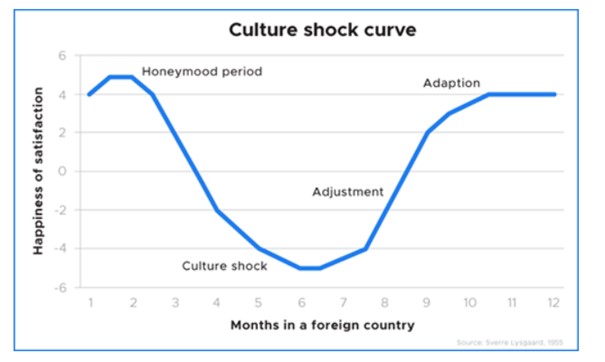Culture shock. What is it and how to overcome it?

Editor

Photo by Jakub Żerdzicki, Unsplash
related articles
But culture shock isn't just about strange foods or trying to navigate public transport without speaking the language. It’s a psychological phenomenon that can catch even the most seasoned traveler off guard. So, what exactly is culture shock, and how can you survive it without losing your cool (or your appetite)?
What is culture shock?
In simple terms, culture shock is the disorientation you feel when encountering a new culture that differs from your own. It's like being dropped into a world where nothing quite works like you’re used to. The language, social customs, etiquette, and even everyday things – like the hand gesture people use when thet point at something – can feel foreign.
It can happen whether you move to a new country, start a job in a different region, or even just go on vacation. And while culture shock sounds like an exciting adventure (and sometimes it is), it often comes with stages of discomfort that can make you feel like an extraterrestrial being on your own planet.
The four* stages of culture shock
But it’s worth noting that culture shock is not a singular event. It’s a process, during which thry way our feelings shift, and pass through the four following stages:

Picture source: Sverre Lysgaard, 1955
- The Honeymoon Stage
This is the phase where everything is exciting and new. You’re fascinated by the differences in culture, charmed by its quirks, and in love with the adventure. You might find yourself saying things like, “The coffee here is SO much better!” and “I’m going to start wearing berets like this forever.” Enjoy this stage while it lasts, because at some point there comes an end to every honeymoon, and reality is going to hit soon. - The Rejection Stage
Cue the “What on earth am I doing here?” moment. This is where homesickness creeps in, and the differences that once seemed quaint – now just seem overwhelming. Maybe it’s the 4-hour siesta that happens just when you need something from the store, or the fact that no one seems to understand your sense of humor. At this stage, you might find yourself missing and perhaps even idolizing life back home, and become highly critical of the new culture. This may lead to the feelings of anxiety, frustration and even depression. - The Adjustment Stage
Slowly but surely, things start to make sense. You've picked up some key phrases, figured out that lunch happens at 3 p.m., and discovered that no, people here they don't hate you – they just don't smile as much as people in your home country. The frustration fades, and you're starting to appreciate the rhythm of the new culture. - The Acceptance Stage
At last, you reach a stage where you're not just surviving, you're thriving. You may never fully become part of this new culture, but you've made peace with its quirks. You start feeling at home in your surroundings, and you can laugh at the things that once annoyed you. Welcome to cultural acceptance. (And congrats – this is where the fun really begins!) - *The hidden stage, aka “Re-entry Shock”
Don't forget about the sneaky fifth stage of this journey: re-entry, aka reverse culture shock. Yep, it’s a thing! After spending ages abroad, coming back home can feel... unfamiliar. You might notice that everything has changed – your family, friends, even your favorite hangout spots – and suddenly, it feels like you’re the one who doesn’t quite fit in anymore. What’s worse, all those cool customs and habits you picked up overseas?
Yeah, they might not fly back home. “All French berets abandon all ye who enter here”, and so on…. So, guess what? You’re back at square one, adjusting and adapting all over again! Culture shock is a gift that just keeps on giving, even though you wish it wouldn’t.
What are the common symptoms of culture shock?
It is worth noting that culture shock doesn’t look the same for everyone. There are however a few telltale signs that you might be in the throes of it:
- Irritability: Even the simplest tasks – like buying groceries – can make you feel like you're navigating a minefield.
- Homesickness: You miss familiar things, from friends to food. Even that weird canned soup you never liked back home somehow now starts to seem good.
- Social withdrawal: You might start avoiding social situations because it feels exhausting to keep up with the cultural differences.
- Physical symptoms: Stomach issues, headaches, or trouble sleeping are not uncommon during culture shock, as stress takes its toll on your body.
- Mood swings: One minute you're thrilled by a local festival, and the next – you're teraing up over a text from home.
How to overcome culture shock?
The good news is that culture shock is totally normal – and temporary. Here are some uswful tips on how to make sure it doesn’t knock you out:
- Learn the language (even just a little): No one expects you to become fluent overnight, but knowing a few key phrases can make a world of difference. Not only will you feel more confident, but locals will appreciate your effort. Bonus: learning a language can help you understand cultural nuances that otherwise might seem strange. Plus, it’s fun to impress people back home by casually dropping foreign phrases into conversation (just don’t overdo it – or all your close ones might wish you had stayed abroad, than you very much).
- Embrace the differences: Instead of resisting the quirks, lean into them. Try the bizarre-sounding dish, join in the strange local customs, and go with the flow. The more you engage with the culture, the less alien it will feel. And who knows – you might even find yourself genuinely enjoying things you once found baffling. After all, travel is all about expanding your comfort zone.
- Stay connected to Home (but don’t dwell on It): It’s tempting to call home every day, but if you spend too much time focused on what you're missing, you'll miss out on what’s happening right in front of you. Stay in touch with friends and family, but make sure you're also investing time in your new surroundings.
- Find a routine: Establishing a daily routine can help you feel grounded in a new place. Even small things, like finding a favorite café or going for a walk every morning, can give you a sense of stability amidst the chaos.
- Make local friends: Making friends with locals will give you insights into the culture that no guidebook ever could. Plus, it's way more fun to learn about a new place from people who live there. They can explain the things that seem strange and help you navigate the social landscape.
- Laugh it Off: Humor is a universal way to deal with stress, so when in doubt – laugh. Spent five minutes miming to the cashier what type of milk you want? Laugh it off! These awkward moments will make for great stories later. Plus, no one expects you to get everything right immediately.
Culture shock isn’t all that bad
Though it can be uncomfortable at times, culture shock is ultimately a good thing. It means you're growing, learning, and experiencing the world in a new way. Overcoming culture shock often leaves you feeling more adaptable and open-minded, not just about other cultures, but about your own too.
So, next time you're standing in front of a foreign menu, just remember: the adventure you're having – awkward moments and all –is exactly what makes traveling (and life) so memorable.
Sources:
Harvard International Office, “Adjusting to a New Culture”
Now-health.com, “Culture Shock Stages: Everything You Need to Know”, 2020












